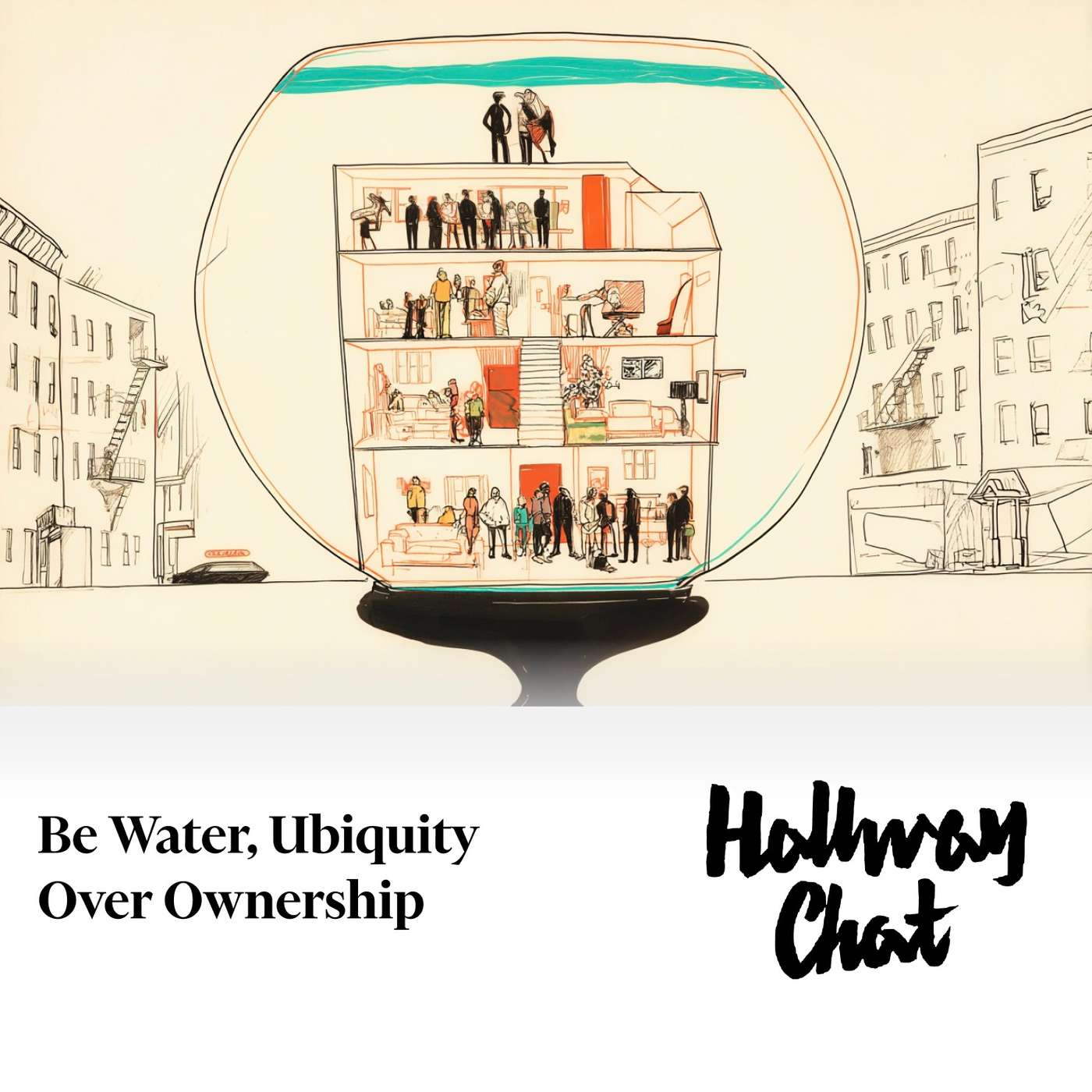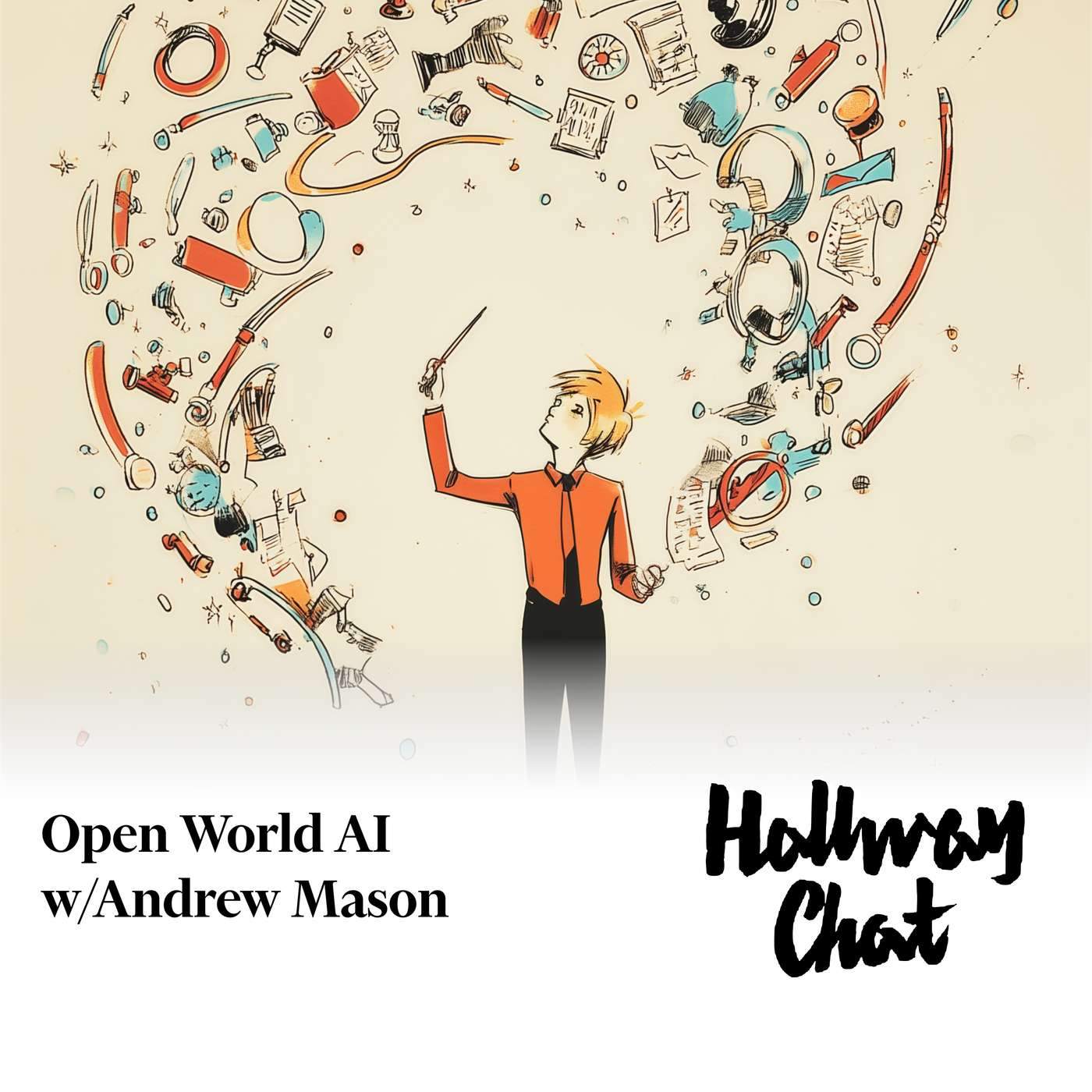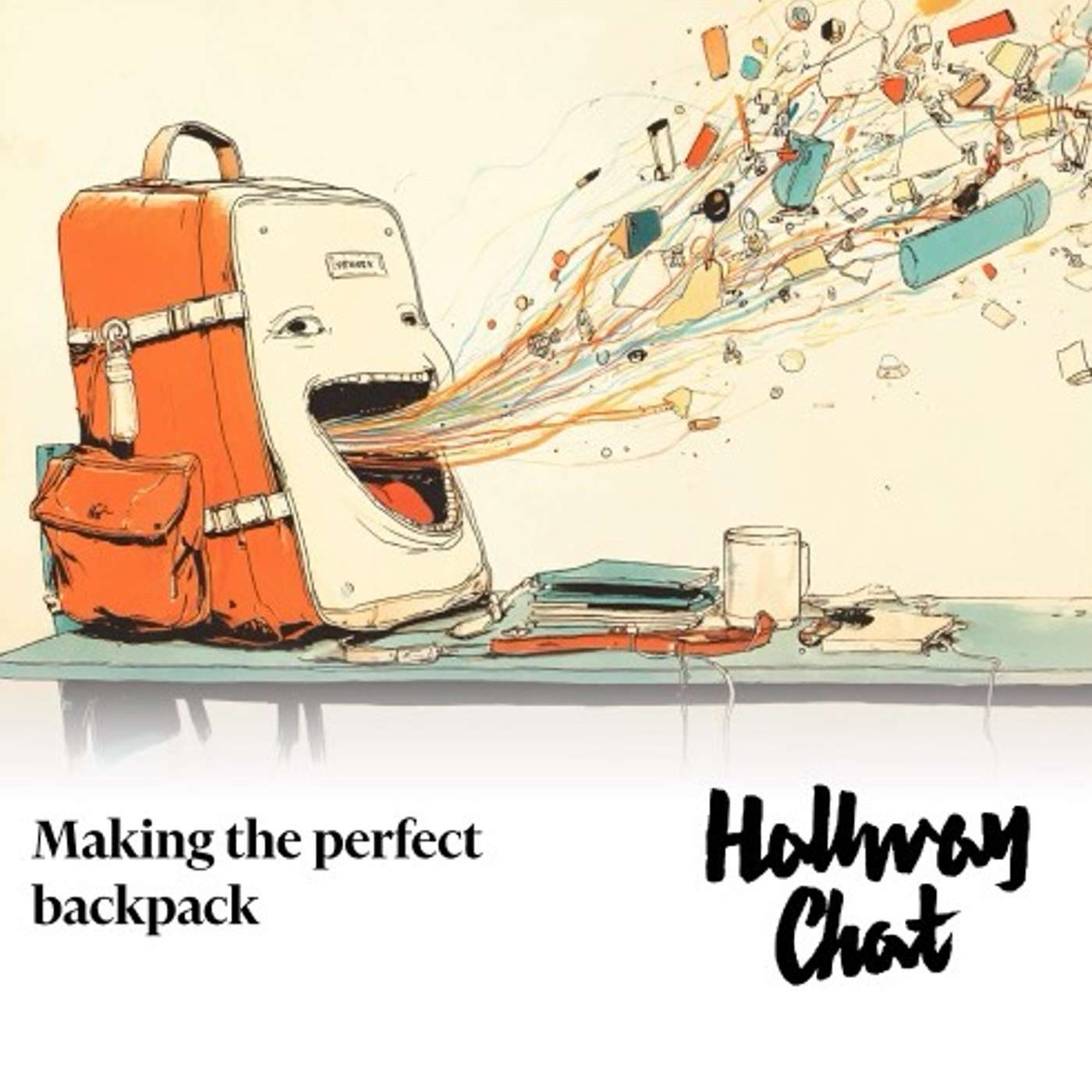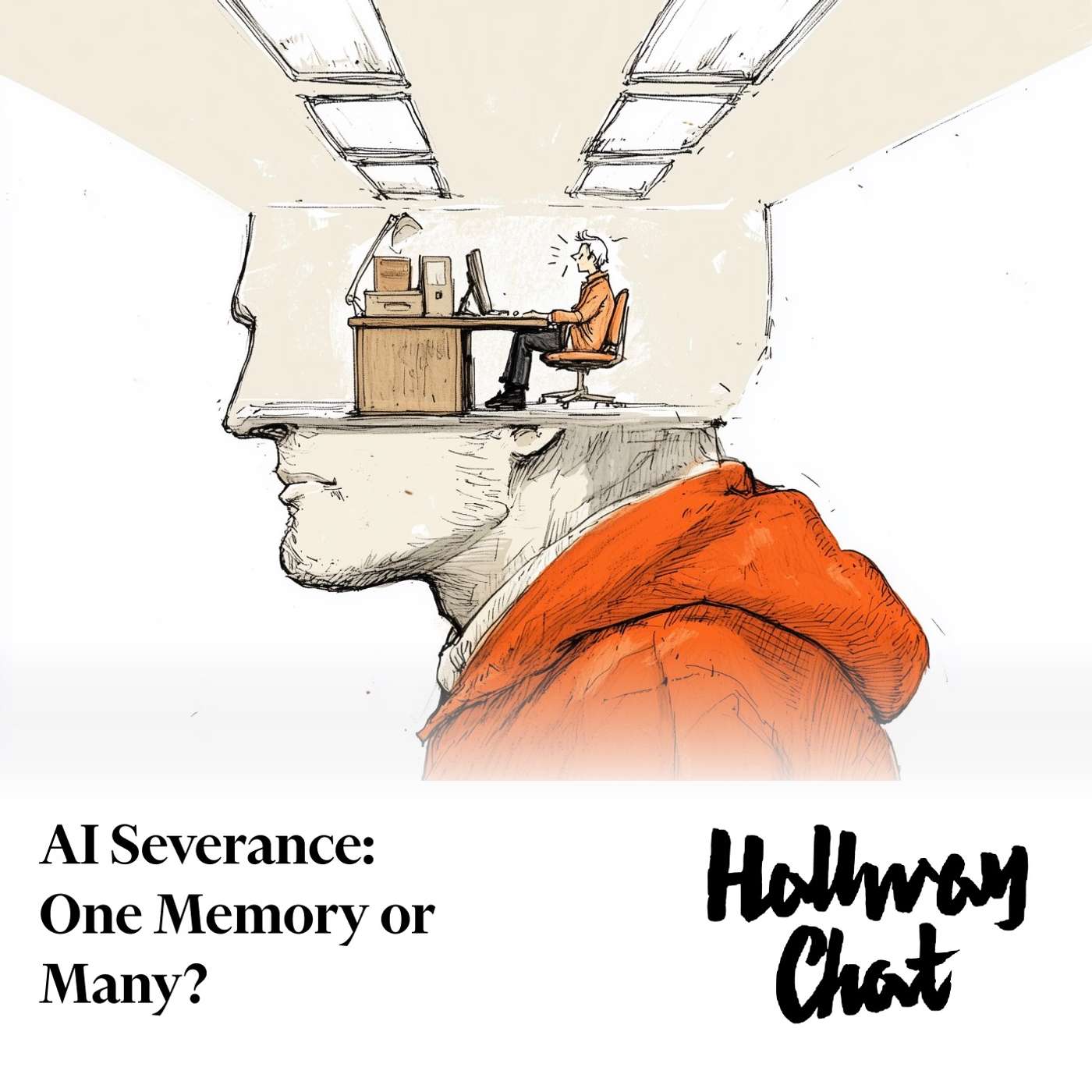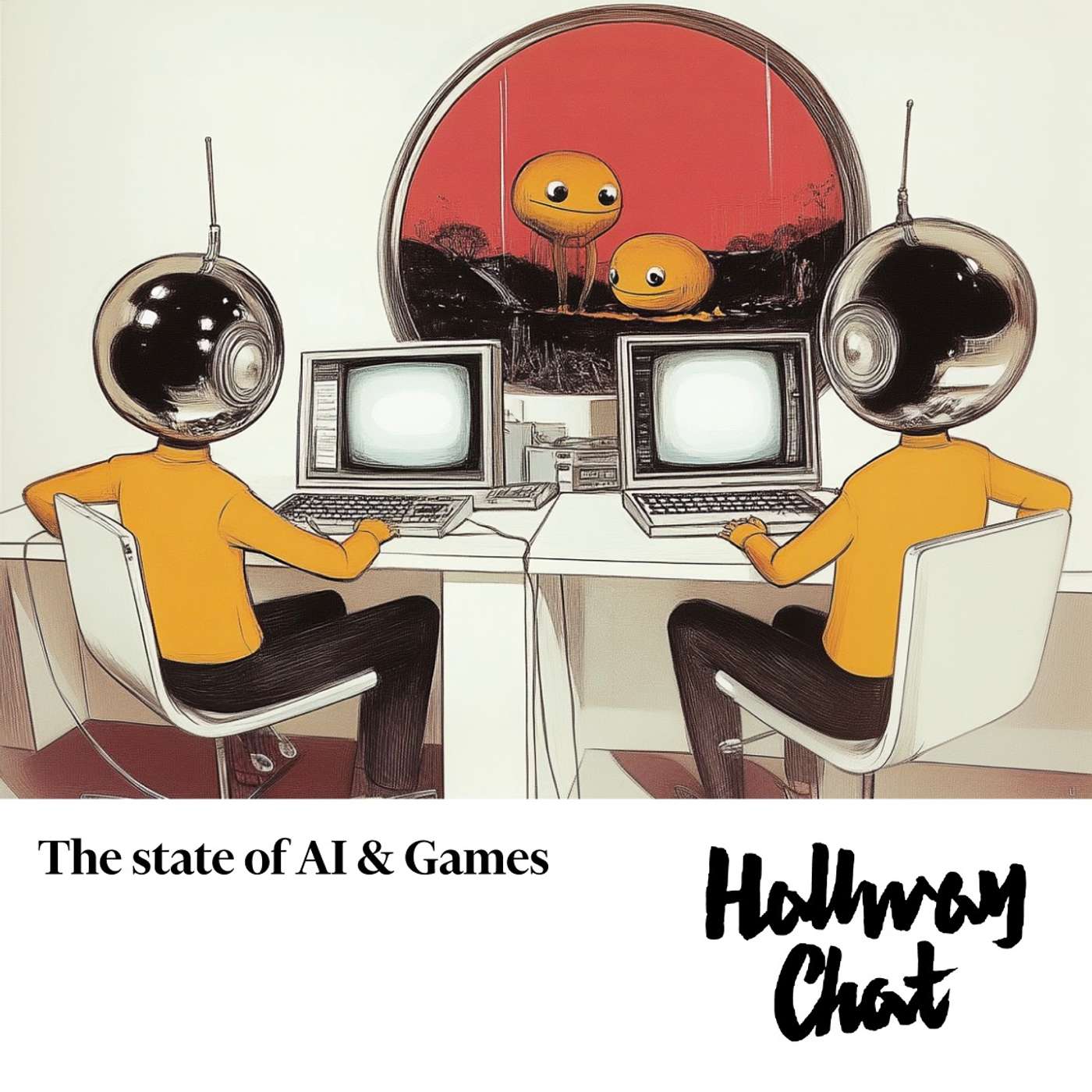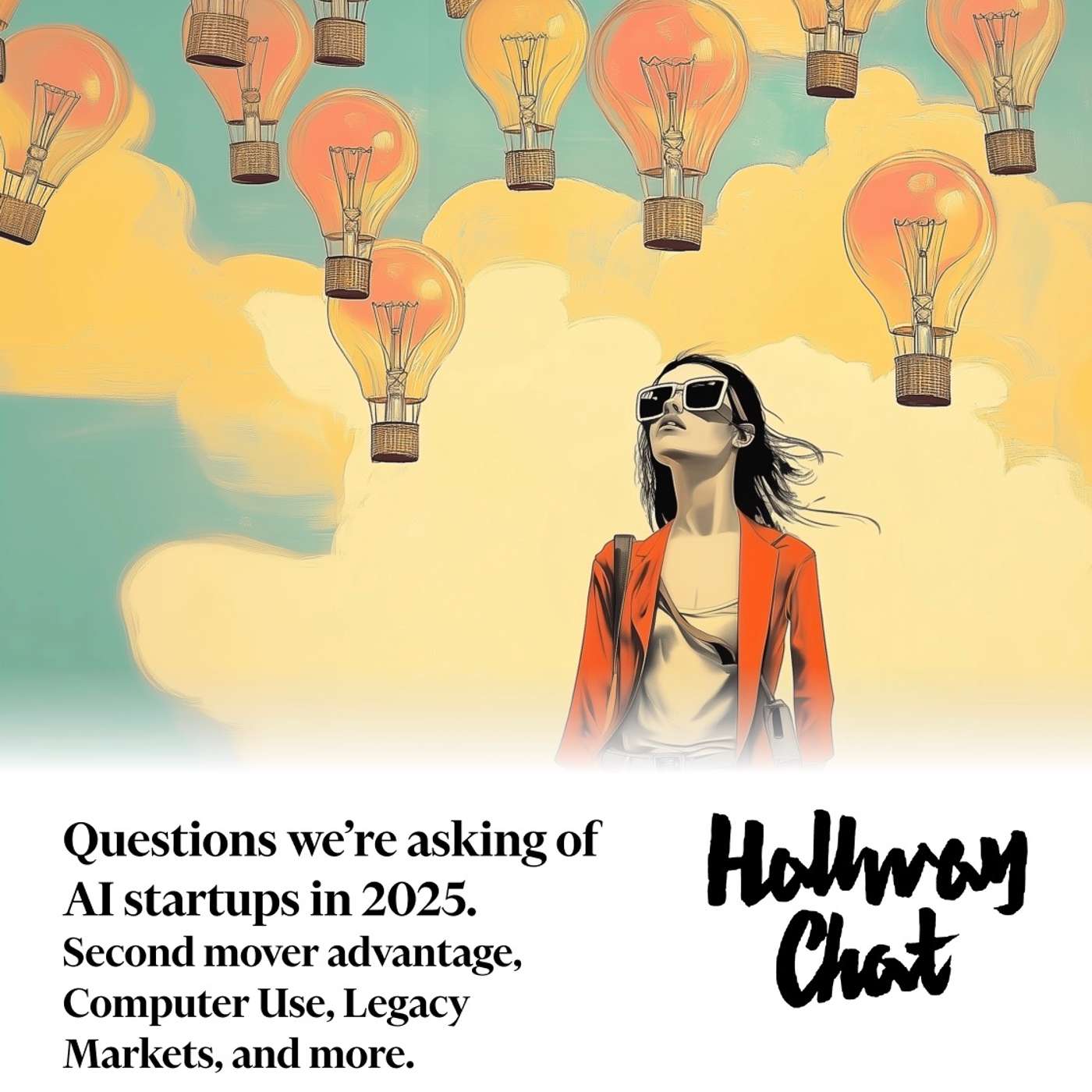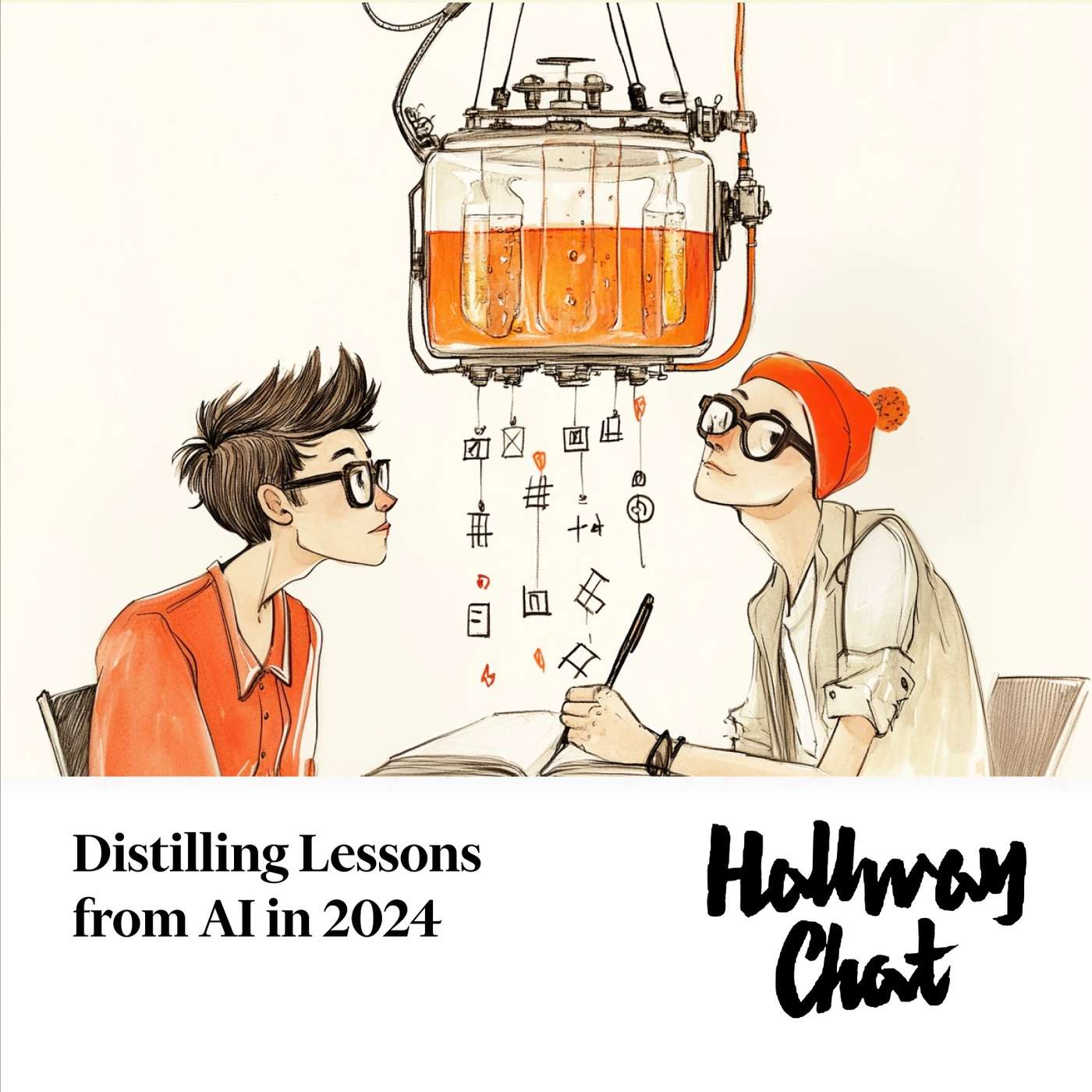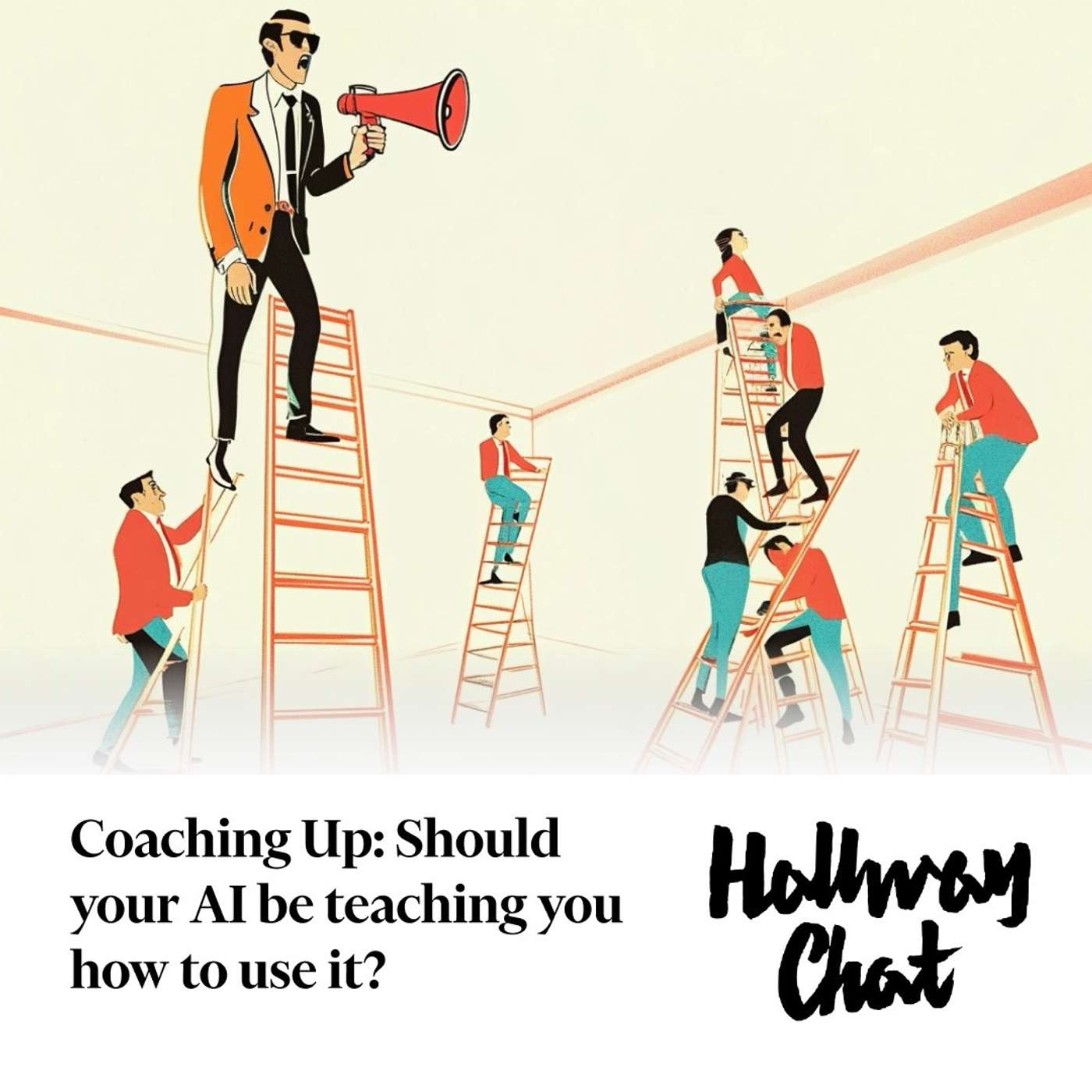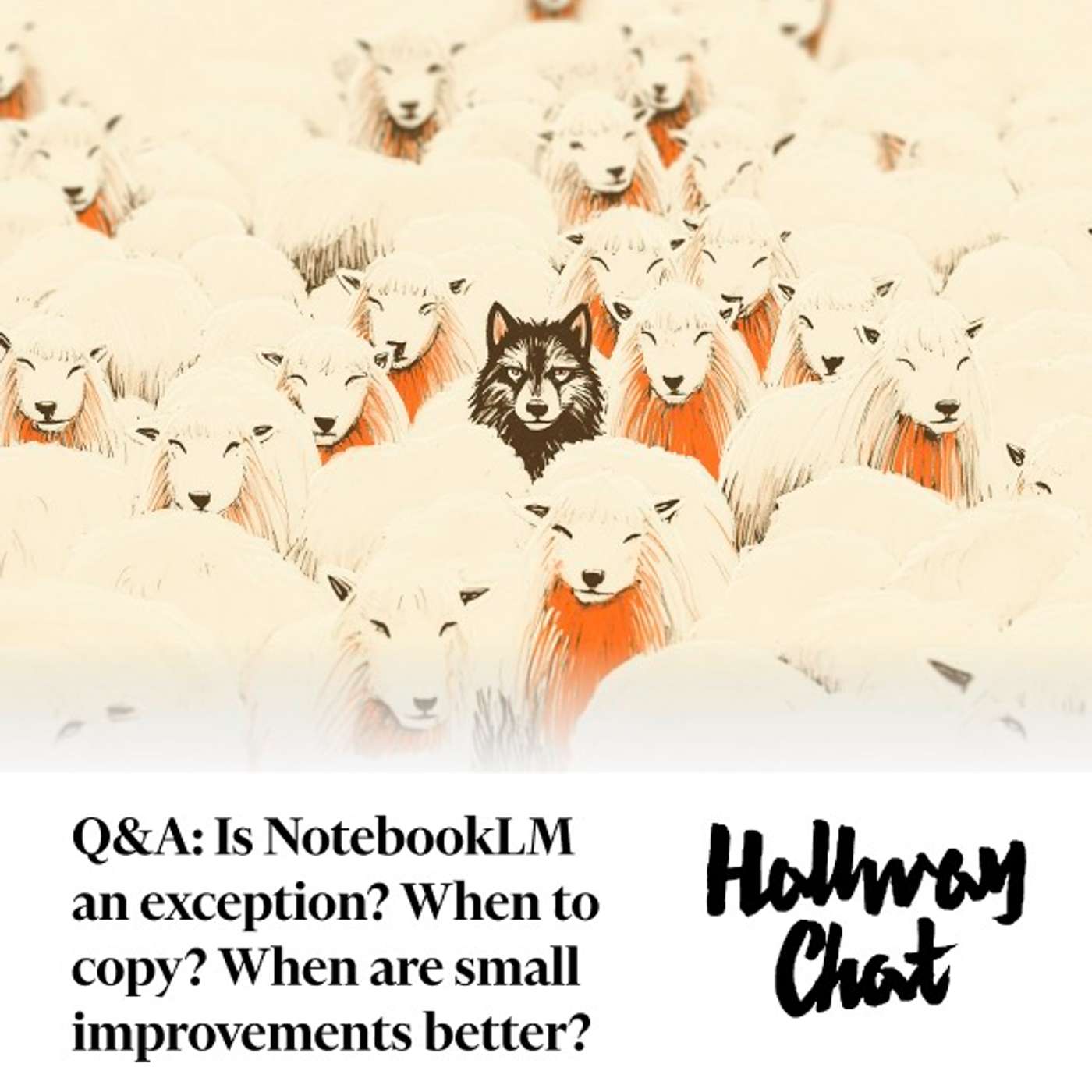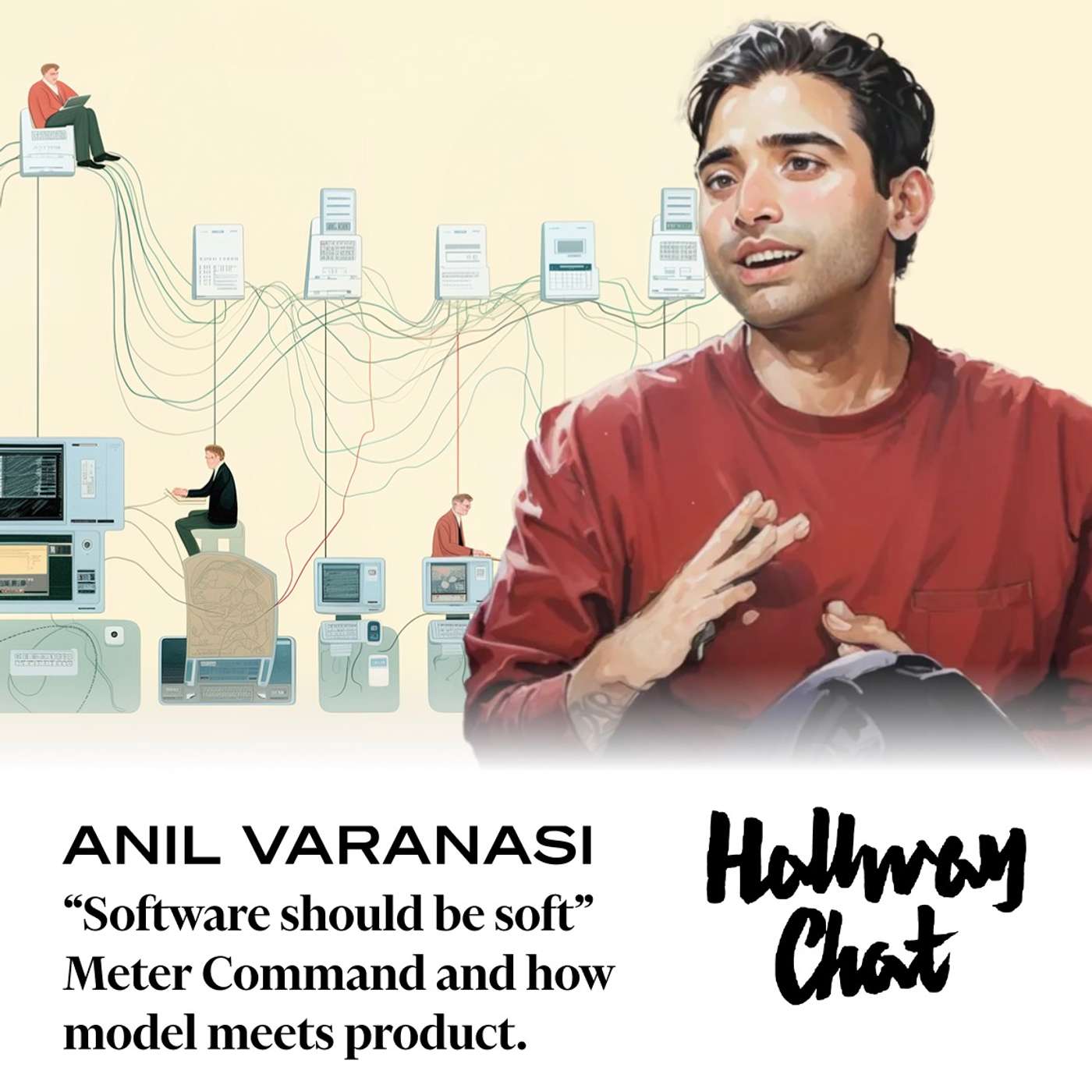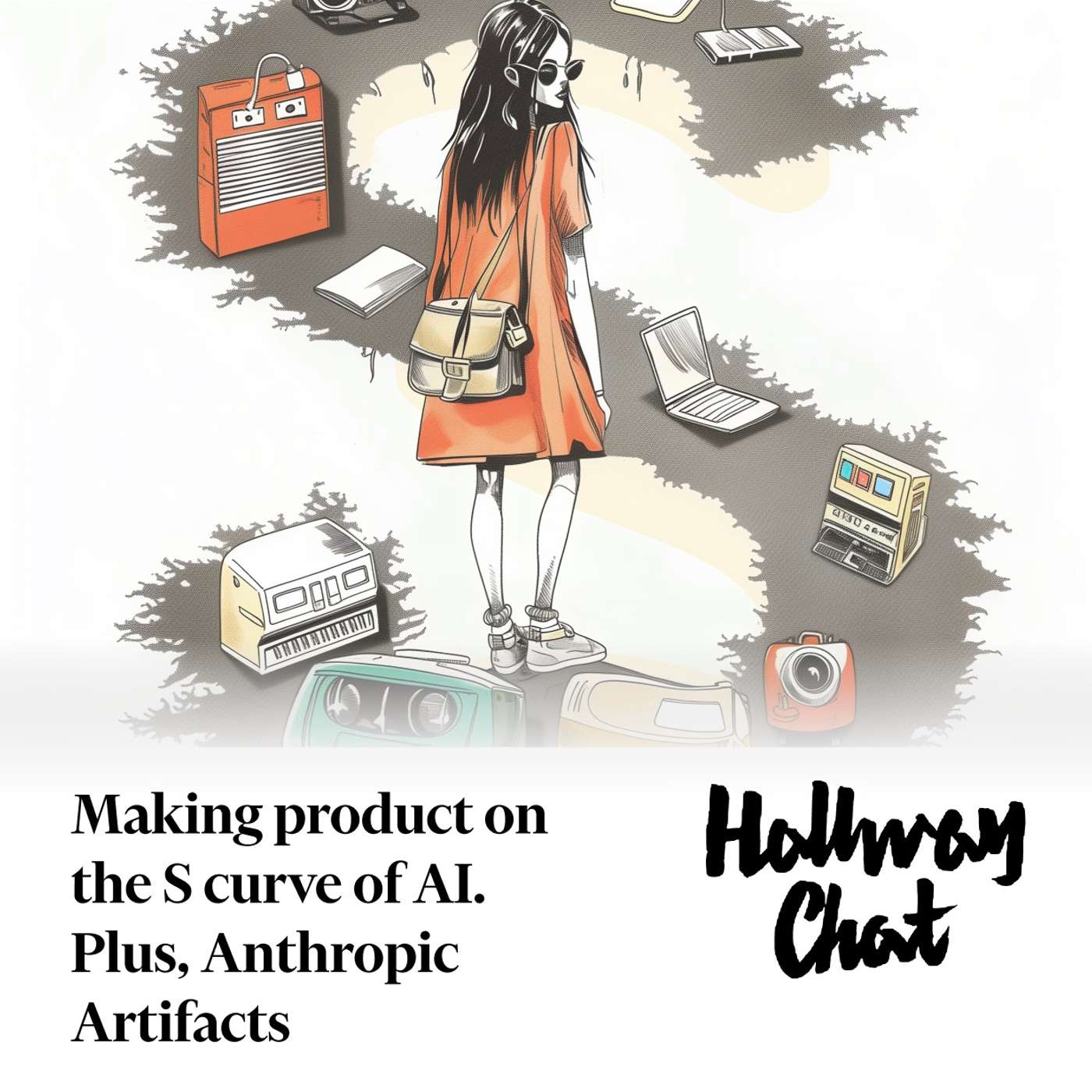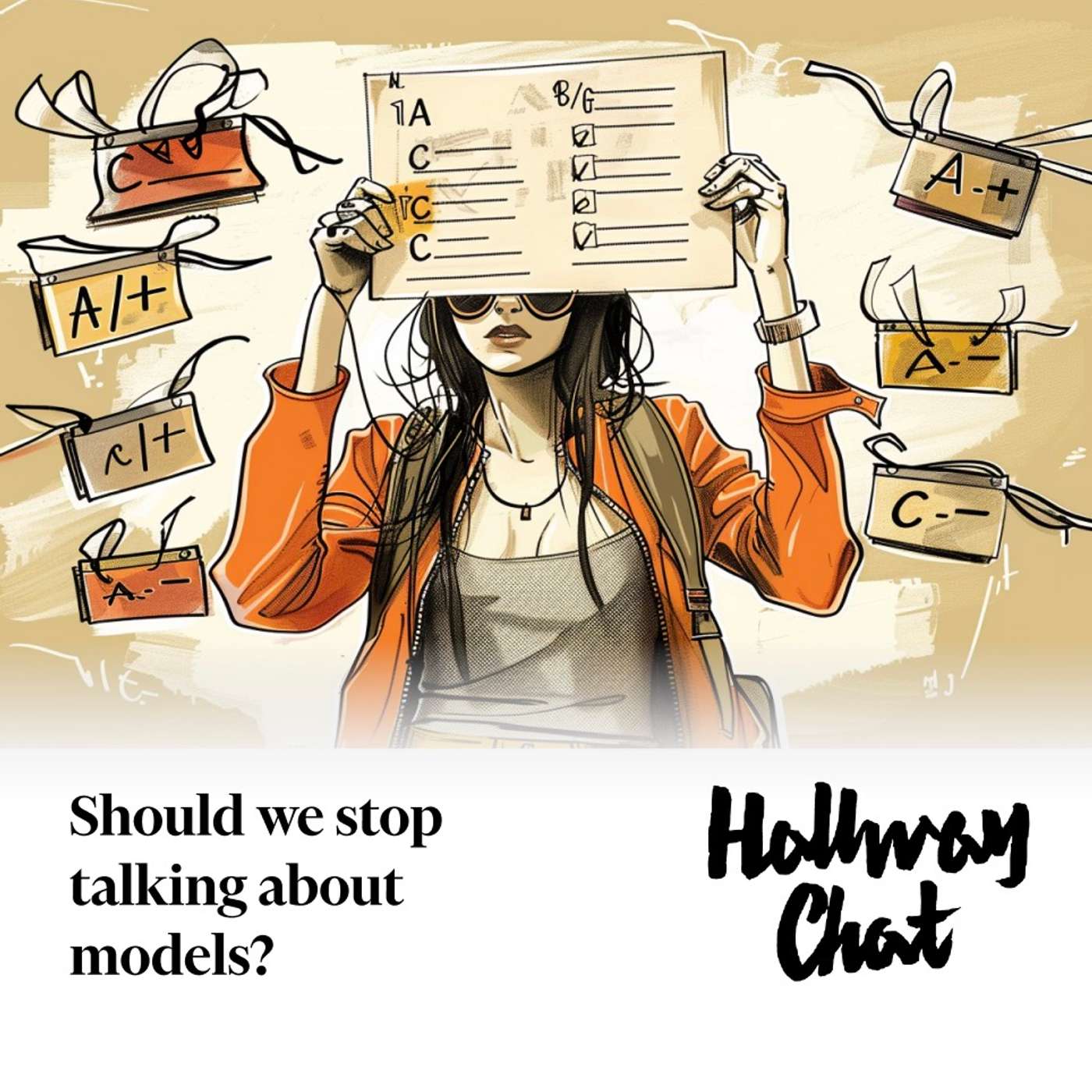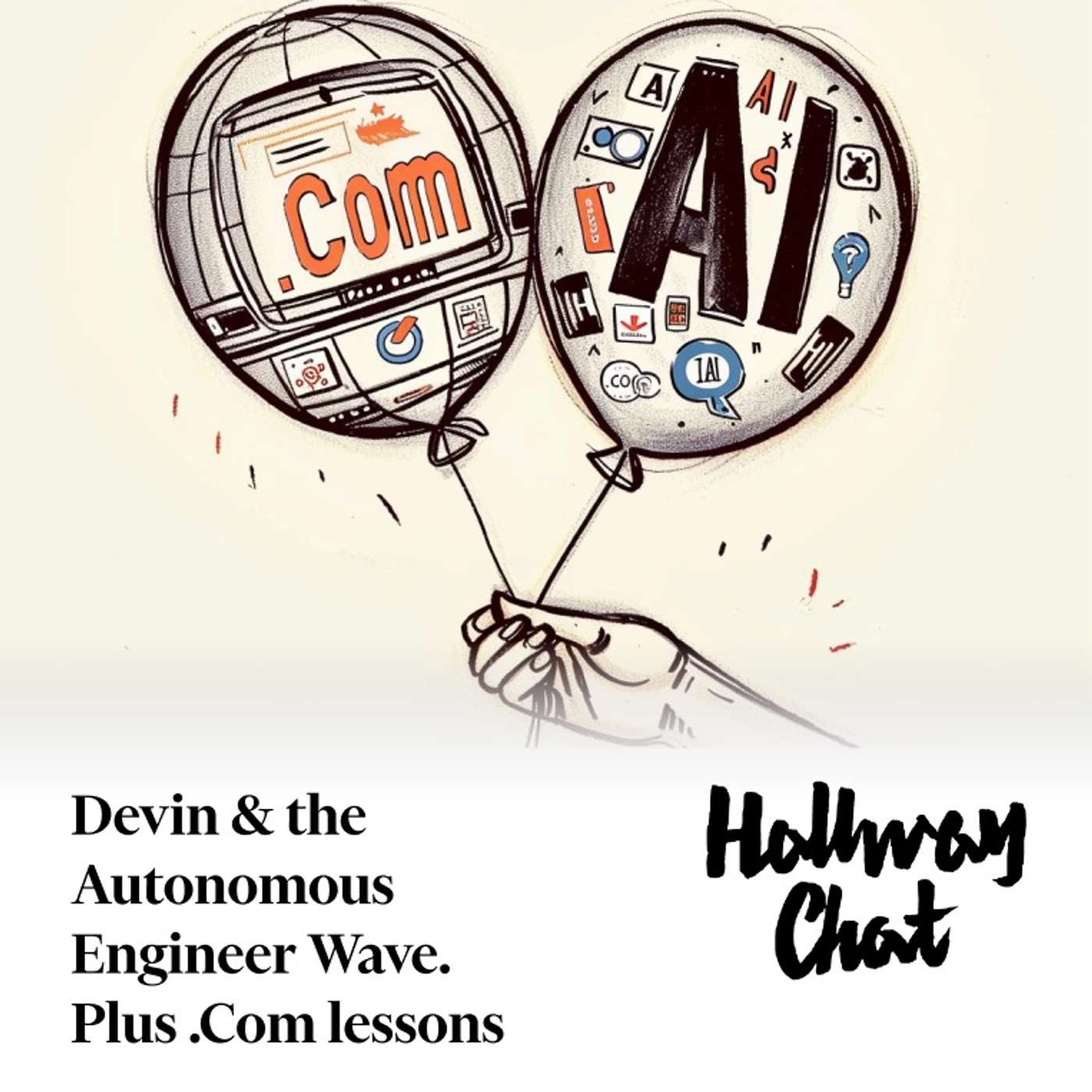Discover Hallway Chat
Hallway Chat

Hallway Chat
Author: Fraser Kelton & Nabeel Hyatt
Subscribed: 9Played: 28Subscribe
Share
© All rights reserved
Description
Fraser & Nabeel explore what it means to build great products in this new world of AI.
Two former founders, now VCs, have an off-the-cuff conversation with friends about the new AI products that are worth trying, emerging patterns, and how founders are navigating a world that’s changing every week.
Fraser is the former Head of Product at OpenAI, where he managed the teams that shipped ChatGPT and DALL-E, and is now an investor at Spark Capital. Nabeel is a former founder and CEO, now an investor at Spark, and has served on the boards of Discord, Postmates, Cruise, Descript, and Adept.
It's like your weekly dinner party on what's happening in artificial intelligence.
Two former founders, now VCs, have an off-the-cuff conversation with friends about the new AI products that are worth trying, emerging patterns, and how founders are navigating a world that’s changing every week.
Fraser is the former Head of Product at OpenAI, where he managed the teams that shipped ChatGPT and DALL-E, and is now an investor at Spark Capital. Nabeel is a former founder and CEO, now an investor at Spark, and has served on the boards of Discord, Postmates, Cruise, Descript, and Adept.
It's like your weekly dinner party on what's happening in artificial intelligence.
40 Episodes
Reverse
Why are dentists so into vibe coding? Where's the Steve Jobs of this era? In this episode of Hallway Chat, Fraser and Nabeel discuss the viral AI assistant Poke, within the broader context of the rise of niche AI applications. They also talk about the importance of specialization in AI applications, AI’s role in advancing scientific discovery and societal progress, and the future of AI in creative fields like music and art. Plus, a compelling use case for AI-enabled accessibility.
(00:00) - Cold Open
(02:28) - Exploring Poke, a New Email Assistant
(06:41) - The Role of Personality in AI Products
(09:33) - Raising the Floor on AI Email Assistants
(11:00) - The Future of AI Assistants
(14:55) - Customer-Centric Product Development
(28:00) - The Evolution of Coding AI
(30:22) - Specialized AI Applications
(31:59) - The Impact of Open World Agents
(36:53) - Raising the Bar in AI Innovation
(45:51) - Teaching AI Ethics
(49:26) - The Future of AI in Creative Industries
(52:29) - AI and Accessibility
In this episode of Hallway Chat, Nabeel and Fraser unpack the emerging power of tool use, reasoning traces, and code execution in modern models. They reflect on how startups can stay ahead in a market that feels like it changes every 90 days, and what product choices separate the winners from the also-rans.The conversation spans Conductor’s clever planning/execution design, Notion’s everywhere-at-once API strategy, and the subtle ways models persuade us—sometimes too effectively. Along the way, they explore how founders should handle VCs circling during competitive raises, why misinformation concerns may be shifting, and why Fraser still turns to Gemini for certain jobs despite its quirks.It’s a candid look at the red-ocean dynamics of AI, the importance of owning your narrative, and how the future of work may mean managing a team of agents as naturally as we once managed people.
(00:00) - Cold Open: Not Owning the UI
(00:28) - Welcome Back + Era Check
(01:26) - Tool Use Crosses the Rubicon
(02:24) - Code + Browse + Reasoning = The New Triumverate
(04:47) - Steerability & Plan Mode UX
(05:46) - Why Code-Writing Hasn't Infiltrated Apps (Yet)
(07:55) - Be Water: Notion's Everywhere Strategy
(08:55) - Managing Many Agents Is... Tiring
(15:41) - Model Divergence & The Need for a Picker
(20:19) - Red-Ocean Reality & Controlling the Narrative
Nabeel and Fraser sit down with Andrew Mason, founder of Descript, for a deep dive into evolution "open world agents" in AI products. The trio uses the recent Airtable re-founding as a lens to look at open world agent architecture, what makes a great AI-enhanced user experience, and how Descript is embracing agent-first workflows as well. From the positioning of chat windows to the philosophy of “rewiring” users for AI, this conversation explores the strategic decisions shaping the next generation of software tools—and what it really takes to build a product users trust, understand, and love.
(00:00) - Open World AI w/ Andrew Mason
(00:47) - Introduction and Guest
(01:01) - Discussing Airtable's AI Implementation
(01:49) - "Cursor for X"
(03:35) - The Challenge of Surfacing AI Work
(05:08) - Review States and AI Adoption
(07:05) - Airtable's Refounding Moment
(08:13) - Open World Agents vs Agents on Rails
(10:56) - The Power of Chat as Primary Interface
(37:55) - Feature Discovery Through AI
(45:25) - The Future of Product Design with AI
Craft in the age of AI. Nabeel and Fraser start with a dive into what makes the Boundary backpack so great. They explore how AI is changing the way we do customer research, the importance of obsessive attention to detail, and why great founders still need great taste. Along the way, they debate what it takes to recreate the creative magic of “1930s Paris” for modern product builders.
(00:00) - Opening
(00:27) - Backpacks and Craft
(05:36) - AI's potential role in product refinement and customer research
(08:42) - The Down Power Wash Dish Spray?
(10:08) - Consumer packaged goods and the importance of user research
(15:38) - Creating environments that foster creativity and innovation
(35:21) - The importance of solving fundamental problems in startups
(37:47) - Microsoft Teams as a signal about founders
In this episode of Hallway Chat, Nabeel and Fraser explore the future of AI through the lenses of memory, context, and product design. They debate whether users will maintain separate AIs for work and home, why visually verifiable output is critical to product success, and how startups should behave in a world where the best models become commodities. From the case for uneconomical AI to the trade-off between 500 average agents and one brilliant one, they unpack what it takes to build great AI products—and when, if ever, VCs should preempt funding rounds.
(00:00) - Chapter 1
(01:54) - Will AI Democratize Like the iPhone?
(03:03) - Should You Burn Tokens to Win?
(06:25) - The Case for Going Big with Compute
(09:09) - 500 Agents or One Genius?
(18:19) - The Importance of Proof of Work
(19:49) - Building the Right UI for Agents
(22:23) - Visualizing AI Output: A Design Challenge
(33:37) - Memory Wars: Work AI vs. Personal AI
(35:01) - Consumer Benefit > Privacy?
(37:36) - Whats at stake, your memory
(45:28) - Model Switching as a Feature, Not a Bug
(53:53) - VC Talk: When to Preempt a Round
Nabeel and Fraser debrief on GDC and the opportunities for innovation beyond the conservative approaches in an industry going through a funk. They touch on the experiences at the recent GDC, including the growth of AI in gaming and the recurring challenges faced by developers. The discussion also covers the competitive landscape of AI startups, the importance of stacking wins, and the nuanced differences between building games and software products. Notably, they highlight the intriguing possibility of a vibrant game creation ecosystem driven by new model capabilities and the compelling idea of making game creation itself a multiplayer experience.(00:00) - Introduction: Bridging the Gap in the Gaming Industry
(00:35) - GDC Week Highlights and Reflections
(01:41) - Challenges and Innovations in AI and Gaming
(03:50) - The Broken Ecosystem of Game Distribution
(07:45) - The Future of Game Development and Creativity
(19:59) - The Future of Multiplayer Coding
(21:09) - The Magic of New Capabilities
(22:07) - From Capabilities to Durable Products
(23:39) - Stacking Wins for Long-Term Success
(33:54) - Innovations in the Gaming Industry
We have evals for AI models, what about AI products? Today, Nabeel and Fraser talk about building computer games through vibe coding, and just when we might see a breakout success of an AI-built game. Through this discussion, they also explore what building a platform that curates weird AI experiments might look like, particularly one that builders could use for discovery and inspiration.
(00:00) - Ep. 33 - Do we need a leaderboard for AI products
(01:32) - Exploring Vibe Coding and Community Building
(03:41) - AI Gaming and Future Prospects
(07:36) - separate cross talk
(09:28) - Creating an AI Meta
(11:31) - Exploring AI Apps and Platforms
(15:10) - Building a Curated AI Product Platform
Today, Nabeel and Fraser tackle the questions they've been asking internally. What level of improvement would it take to disrupt an incumbent product? They also explore what advantages second movers have in product markets, the emerging importance of reasoning models and computer use products, and what makes certain legacy markets ripe for AI reinvention.
(00:00) - Intro
(01:28) - Can 10% better, year after year, win?
(10:43) - The questions we are asking
(11:11) - Second Mover Advantage
(26:55) - Exploring Deep Research and Competitors
(29:11) - The Future of Computer Use
(35:56) - AI as Muse: Enhancing Human Creativity
Nabeel and Fraser sit down for a round-table discussion with Chris Pedregal, founder and CEO of Granola, an AI note taking app, to discuss Granola’s evolution and product philosophy. Their conversation touches on the challenges of developing user-friendly AI products, and how to balance that with product vision. They also talk about what it’s like being a second-time founder, as well as if and when AI wearables will gain widespread adoption.
(00:00) - Christopher Pedregal - Granola & the Art of Invisible AI
(01:05) - Second time founder syndrome
(01:42) - The path to Granola
(04:13) - Starting by "playing"
(11:16) - The friend test
(12:25) - Product philosophy behind Granola
(16:25) - AI as Augmentor
(22:04) - Balancing beginner and expert users
(34:21) - Granola's Initial Launch and Challenges
(34:52) - Balancing Product Development and Market Fit
(35:58) - Where Granola is headed from here
(40:00) - Vertical AI vs. General Assistants, who wins where?
(42:44) - The Wisdom of Experts Era
(50:54) - AI passing judgement
(53:51) - Wearables role in AI
(01:00:25) - Social Dynamics and Privacy Concerns
(01:02:32) - The Need for New Norms and Labels
(01:03:01) - What else could be Granola-ized
What lessons will we take from 2024's AI products into next year? How better to reflect on advancements in the field of AI over this past year than to ask AI itself? Today, Fraser and Nabeel use AI models like ChatGPT, Claude, and o1 to first look back and see if products and innovations of 2023 lived up to their hype in 2024. And to look at the show’s year in review, Nabeel puts these AI models to the test by feeding them episode transcripts and seeing which model produces a usable summary. Together, they also dive into the effectiveness of Google Gemini’s Deep Research tool, the rise of agentic computing in 2024, and whether products ever fundamentally change or just get constantly re-invented.
(00:00) - Introduction
(00:48) - Reflecting on a Year of AI Releases
(00:23) - The Rise of Agentic AI
(00:38) - Google Gemini’s Deep Research
(00:47) - Using AI Models to Review 2024 at Hallway Chat
(00:56) - The Role of Taste in Making Great AI Products
(00:06) - The Rollout of o1
(00:06) - WebSim - Self Expression Through Software
(00:36) - Same Products, Different Iterations
(00:39) - A Second Look at Apple Intelligence
(00:10) - Living Agentically with AI
(00:18) - Final Thoughts
Everywhere you turn, companies have shoved AI features into their products that no one is using. Today, Fraser and Nabeel ask each other—are there any AI features that you’re actually using in older products? Plus: How kids will be shaped using AI products daily. What would a fully unstructured Slack look like. AI email habits. Do we think incumbents will catch up with AI integrations? PREM framework for startup prioritization. Is this startups vs incumbents, or just startups vs the big llms?
(00:00) - Intro
(00:52) - Welcome to Hallway Chat
(01:05) - What have incumbents really done with AI?
(08:59) - Trends in AI integrations that work
(20:21) - Reflecting, it's still early
(23:42) - Creating AI that manages up
(28:47) - PREM: A framework for prioritization
(34:32) - Forget incumbents, how do startups fight fend off the LLMs?
(37:24) - What are the new horizontals?
Open format Q&A this week. Fraser and Nabeel explore AI data privacy, the ethics of copying features, and maintaining innovation. They discuss enterprise data challenges, the importance of a strong product identity, and strategies for early-stage startups during fundraising season.
(00:00) - Open
(00:53) - Q&A Session Kickoff
(01:14) - The data you gather is your roadmap
(14:03) - The gravity of slowing down in your startup
(21:20) - Your quarterly goal: Something Fundamentally Changes
(21:57) - Low Risk, Low Outcomes
(24:31) - Large Organizations and Mediocrity
(30:58) - When to steal a feature?
Join Fraser, Nabeel, and special guest Anil from Meter as they dive into the innovation behind Meter Command. Meter's new interface has been called the "future of software" and a far ranging interview talks about the problem of designing product around personas, how command interfaces bridge the gap between CLI and dashboards, the importance of owning your tech stack, how your data is your product roadmap, and the orientation to long term thinking while still staying on the cutting edge. Links* See a demo of Meter Command* There's a lot of fine work from Bret Victor on visualization and interfaces, but here's one to get you started* Geoffrey Litt's Malleable SW in the age of LLMs* Hunter Walk's post on OKRs post his stint at Google
(00:00) - Intro
(00:19) - Meter Command and the future of software
(03:36) - What we forget about software making
(06:39) - Models make you reassess your own product
(07:27) - Why aren't there more AI explorations in software?
(09:38) - The "efficiency era" of startups
(13:21) - Software should be soft
(17:13) - The problem of "persona building" software
(21:29) - Enterprise software is reporting
(22:37) - Your data is your product roadmap
(25:13) - Emersing in the trends of AI as a founder
(27:27) - From janky prototype to custom model building
(29:55) - "No AI" - Build for the problem, not the technology
(36:50) - Full stack first, APIs over time
(40:14) - If you want to be early you have to be full stack
(48:28) - Long term orientation
(50:56) - What one thing would you work on now
(55:41) - End
How would you design an AI product differently for a hobbyist vs prosumer vs professional? Using MidJourney as a case study in the passion economy, they delve into how AI tools can help build communities and support semi-professional creators. They explore how these tools can democratize creativity, the role of art vs craft, the role of grit in skill building, cheating vs copiloting, the missing middle of the creative markets, and more. They also touch on the broader implications of AI in different creative fields from music, writing and podcasts. It's an exploration of how AI can help users maintain creative flow and the underserved opportunity for AI to help unleash the hobbyist. Nabeel also spoke on Midjourney's unique growth loops on Unsolicited FeedbackLe Jin has great writing on the passion economy and wrote about the creative middle classLinus has an excellent article on Epistemic calibration that touches on taste, that we didn't get in the episode but worth seeing. Simply Drawing - ai feedback meets artRobert Morris' the Power Broker, which touches briefly on the rise of the professionalized classa little more on why bees wiggle outside of near-term evolutionary needs00:00 Intro00:52 AI in Creative Endeavors01:58 Market Expansion03:01 The underexplored customer in AI08:23 Finding other AI hobbiest opportunities11:31 If they AI made it, are we building skill?13:36 Difference between art and craft14:40 Homework Helpers vs Writing Copilots16:07 Hobbiests are not quite the creator economy17:47 Product for hobbists21:03 The missing middle of creative markets26:42 AI's potential in the education of craft
(00:00) - Intro
(00:52) - AI in Creative Endeavors
(02:00) - Market Expansion
(03:02) - The underexplored customer in AI
(08:25) - Finding other AI hobbiest opportunities
(11:32) - If they AI made it, are we building skill?
(13:38) - Difference between art and craft
(14:42) - Homework Helpers vs Writing Copilots
(16:09) - Hobbiests are not quite the creator economy
(17:49) - Product for hobbists
(21:04) - The missing middle of creative markets
(26:44) - AI's potential in the education of craft
Fraser and Nabeel start by retcon'ing their earlier "maybe we should stop talking about models" and reflecting on the importance of adapting product strategy based how much disruption is happening in your market. The episode highlights the release of Claude Artifacts by Anthropic, and comparing it to other AI product innovations. They also nerd out on the Xbloom coffee machine and a robotic mop. Lastly, Fraser asks about how to navigate when a founder gets introduced to the wrong partner at a VC firm.
(00:00) - Product development early on the S curve, exploring Anthropic Artifacts
(00:43) - Welcome to Hallway Chat
(00:58) - Strong Convictions Loosely Held
(03:37) - Exploring Claude Artifacts
(10:48) - S Curve Product Design
(23:33) - The Instinct to Exhale: Post-Launch Reflections
(25:25) - Balancing Innovation and Stability
(27:00) - Leaning into risk
(32:30) - Question: Getting introd to the wrong partner at a VC
Fraser and Nabeel dive into the evolving landscape of AI note-taking apps, focusing on a new product, Granola. They discuss Granola's unique approach of "enhancing your thought" instead of "thinking for you." They also explore: applying this idea to other categories, the influence of LLMs on UX, and the need for more experimental user workflows to unlock AI. They also discuss the challenges and dynamics of startup funding, the significance of capital in achieving market success, and how dynamics of AI team building are changing. (00:00) - Introduction
(01:05) - Introducing Granola: The AI Note-Taking App
(02:19) - Granola's Unique Features and User Experience
(04:54) - Challenges and Innovations in AI Note-Taking
(06:53) - Granola's Practical Use Cases and Feedback
(09:54) - Reducing Friction in Product Experience
(13:04) - Where is the AI innovation?
(16:11) - The Role of Incentives in Innovation
(21:51) - When competitors raise 10x more than you
(23:11) - Introducing Granola: The AI Note-Taking App
(23:18) - Granola's Unique Features and User Experience
(24:35) - Challenges and Innovations in AI Note-Taking
(25:07) - Granola's Practical Use Cases and Feedback
(25:19) - Reducing Friction in Product Experience
(26:44) - Where is the AI innovation?
(27:12) - The Role of Incentives in Innovation
(27:59) - When competitors raise 10x more than you
(28:34) - Overcapitalization and Its Consequences
(29:21) - Customer-Centric Approach in Startups
(30:22) - How AI Startups are Building Teams Differently
(42:41) - Final Thoughts and Product Recommendations
Is it still worth it to discuss models when discussing startups? Nabeel and Fraser discuss how that may be the wrong question to ask in the current landscape, and why customer-centric questions and user experience should be the basis of product experience. Later, they deliberate who might come out on top in the “horse race” for AI product dominance, and whether it will come from a large, established company, or if the frontier of capabilities belongs to small innovators.
(00:00) - Decoding the Future: Puzzles vs. Mysteries in Tech
(01:22) - Welcome to Hallway Chat: Podcast or Tweets?
(01:35) - Exploring the Venture Firm USV's "Hallway Chat" Tweets
(02:27) - The atomization of media
(03:17) - Rethinking the Focus on AI Models in Startups
(04:38) - The Importance of Use Cases Over Models in AI Innovation
(07:45) - What makes a Foundational Model... Foundational
(18:23) - AI for Consumers: Navigating the S Curve of Innovation
What is the extent of autonomous coding engineer Devin’s ability to generate real, functional applications with little to no help? Nabeel and Fraser dive into the buzz about Cognition’s ‘Devin’, what makes it different, and the transformative potential of AI in software engineering, particularly focusing on autonomous coding software. Later, they get into the innovator's dilemma and the lessons the .com era can lend to this new time in AI.(00:00) Intro(01:23) The buzz about Cognition’s Devin(07:44) What makes Devin different?(12:19) Tolerance for time(16:07) The interface of the future(22:19) Innovating around the incumbent’s advantage(25:30) Cutting edge products mean new user bases(29:52) Netscape was the Open AI of the Mobile Revolution(33:42) Optimism as the engine of capitalism(37:56) The model is not the product
This week is a discussion of the points of differentiation vs commodification in various AI models. Including how these points might change over time, and might change between language, image, and video models. Then Fraser pivots to orienting around jobs to be done in AI, and how the various models have a huge gap between being capable of doing something, and doing it well. We then talk about Claude 3, the nature of benchmarking, and the rapid dropping LLM prices. Lastly, we cover a startup subject, debating the merits of SAFE (Simple Agreement for Future Equity) vs. priced equity rounds in early-stage funding. LinksClaude 3 from AnthropicLMSys Chatbot Leaderboard for which models are sticking out right nowFor areas where models don't differentiate, we are back to the 7 powers framework. Hamilton Helmer's website with overview of the 7 Powers framework: https://7powers.com/, Sachin Rekhi has a good detailed primer on the 7 Powers as well.Carta guide on priced rounds vs SAFEs, which we don't really agree with all the pros and cons, but is a decent overview
(00:00) - Opening
(00:31) - Are models an inevitable commodity?
(05:58) - How image, video, and other models may pan out differently than language
(08:20) - It's not the model, it's the customer
(10:20) - Jobs to be done in AI - 1. Can it do it... 2. very well.. 3. exactly how I want it to.
(22:13) - Claude 3 by Anthropic
(25:25) - ELO Leaderboard Results
(26:25) - Claude 3 Haiku and Falling LLM Prices
(30:33) - SAFES vs priced equity rounds
What is Hallway Chat anyway
(00:00) - Introduction and Podcast Naming



